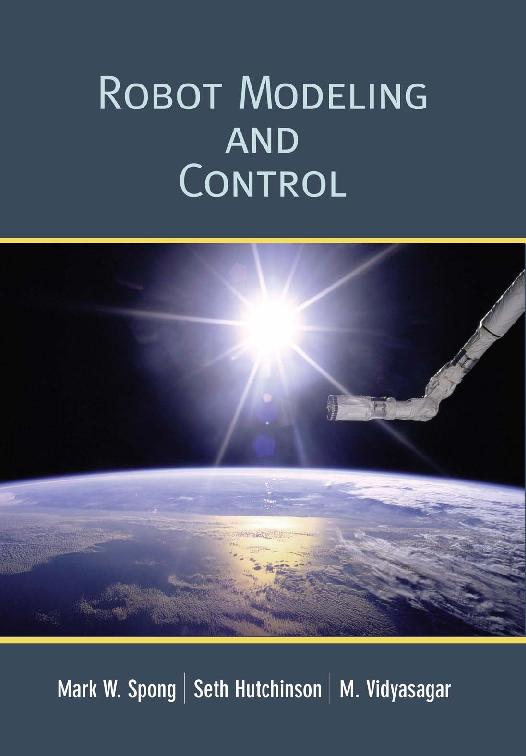 |
Schedule: T&TH 12:30pm - 1:45pm Location: CIS 1045 Instructor: Yu Sun (contact information) Office Hours: ENB 331, T&TH 1:50pm - 3:20pm TA:Ivan Shindev (shindev AT mail.usf.edu) TA Hours: ENB 325, M&W 10:30am to 11:30am |
| Objectives: | |
|
Students will be taught - 1. fundamentals of robotics 2. algorithms for designing robot motion 3. examples of robotic systems |
| Pre-Requisites: | |
|
Data structure, basic linear Algebra, and Matlab
|
| Textbooks: | |
| Required: | |

|
Robot Modeling and Control by Mark M. Spong, Seth Hutchinso, and M. Vidyasagar (ISBN: 9780471649908) |
| Recommended: | Robotics, Modeling, Planning and Control
By Bruno Siciliano, Lorenzo Sciavicco, Luigi Villani, Giuseppe Oriolo Principles of Robot Motion: Theory, Algorithms, and Implementations, by Howie Choset, Kevin M. Lynch, Seth Hutchinson, George Kantor Introduction to AI Robotics, by Robin R. Murphy |
| Schedule (tentative): |
| Date | Topics and notes | Reading | Homework | Due |
| 10 Jan | Introduction | |||
| 12 Jan | Basics of Robotics and Linear algebra | Chapter 1 and Appendix A | HW1 | |
| 19 Jan | Matlab tutorial | Handout | ||
| 24 Jan | Representing positions and rotations | Chapter 2.1, 2.2 | ||
| 26 Jan | Rotational transformations | Chapter 2.3, 2.4 | ||
| 31 Jan | Parameterizations of rotations | Chapter 2.5, 2.6 | HW2 | HW1 |
| 2 Feb | Homogeneous transformations | Chapter 2.7 | ||
| 7 Feb | Kinematic chains and DH convention | Chapter 3.1 3.2 | ||
| 9 Feb | DH convention | Chapter 3.2 | ||
| 14 Feb | Forward kinematics | Chapter 3.2 | HW3(Lab1) | HW2 |
| 16 Feb | Inverse kinematics | Chapter 3.3 | ||
| 21 Feb | Lab 1 section 1 | |||
| 23 Feb | Lab 1 section 2 | HW4 | HW3 | |
| 28 Feb | Angular velocity | Chapter 4.1-5 | ||
| 1 Mar | Jacobian | Chapter 4.6 | ||
| 6 Mar | Mid-term exam | |||
| 8 Mar | Travel | |||
| 20 Mar | Trajectory design | Chapter 5.5 | HW5 | HW4 |
| 22 Mar | Configuration space | Chapter 5.1 | ||
| 27 Mar | Configuration space with examples | Chapter 5.1 | ||
| 29 Mar | Motion planning -- potential field | Chapter 5.2-3 | HW6(Lab2) | HW5 |
| 3 Apr | Motion planning -- PRM | Chapter 5.4 | ||
| 5 Apr | Motion planning roadmap | Chapter 5 | ||
| 10 Apr | Motion planning review | Chapter 5 | ||
| 11 Apr | Lab 2 section 1 | HW7 | HW6 | |
| 13 Apr | Lab 2 section 2 | |||
| 19 Apr | Sensors and actuators | |||
| 24 Apr | Mobile robot | |||
| 26 Apr | Final review | HW7 |
| Homework: |
| Most of the homework has programming problems that can be completed in Matlab. |
| Grading: |
|
50% homework (6% each regular assignment, 10% for each lab) 20% mid-term exam 30% final exam |
| Attendance assessed through pop quizzes: |
| Five pop quizzes will be given for total 5% extra points (1% each) adding to the final grade. They will consist each of a simple question that you should be able to answer in 2 or 3 minutes. The questions will always relate to the last lecture. |
| Tentative Grading Scale: |
|
The tentative grading scale could be as follows.
97 -- 100 A+ 93 -- 96 A 90 -- 92 A- 87 -- 89 B+ 83 -- 86 B 80 -- 82 B- 77 -- 79 C+ 73 -- 76 C 70 -- 72 C- 65 -- 69 D+ 60 -- 64 D 0 -- 59 F |
| Procedures for Alleged Academic Dishonesty or Disruption Of Academic Process: |
|
See current undergraduate catalog.
http://www.ugs.usf.edu/catalogs/0405/adadap.htm
(Or search for “cheating”) |
| Departmental Policy: |
|
All students enrolled in courses taught by the Computer Science and Engineering Department are advised that unless an instructor specifies otherwise, all work done in homework, programming, or exams must be the result of a student’s individual effort. Students who copy, or who provide material for others to copy, or who show dishonesty in their work as described in the university catalog, will be subject to disciplinary action, typically the receipt of a failing grade in the course, but also possible academic dismissal from the program. |
| Course Policy: |
|
Programming homework/projects will be graded. It is OK to discuss homework/projects with other students, but outright copying is not acceptable.
|
| Communications: |
|
Be sure you can log in and can find this class under the Courses tab. Be sure you can find Assignments for this class. Be sure you can receive messages. Don’t let backlog exceed your quota. |
| Disabilities, Absences: |
|
Students with disabilities are encouraged to consult me as soon as possible. If accommodations are needed, a letter from the Office of Student Disability Services (SVC1133) will be required. Please inform me if there is a need for alternate format for documents or a note taker. Students who anticipate the necessity of being absent from class due to the observation of a major religious observance must provide notice of the date (or dates) to me, in writing, by the second class meeting. Students who must miss an exam due to participating in a varsity athletic event should contact me two weeks in advance in order to make alternative arrangements. |
* Every part of this syllabus is subject to adjustment.